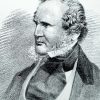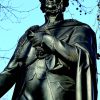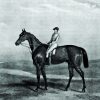Edward Geoffrey Stanley, otherwise known as the 14th Earl of Derby, was three times a Tory Prime Minister of Great Britain and served an impressive 46 years in the parliament. He is the person after whom Stanley Street in North Adelaide is named.
Born to an aristocratic family with a long and proud Whig tradition, and on the advice of the Marquis of Lansdowne who saw promise in him as a teenager, Stanley’s grandfather, the 12th Earl of Derby, purchased a seat in the House of Commons for him from the Tory West Indian proprietor Joseph Barham. Barham had fallen on hard times and was prepared to let the seat go for £70,000, even to a Whig family. It was one of the controversial and vexatious ‘rotten boroughs’ which, as Angus Hawkins says, threw up so many future statesmen and ultimately precipitated the Reform Bill of 1832. Happily, in the by-election which followed in July 1822, Stanley entered the House of Commons as the member for Stockbridge. He was only 23 years of age.
During his first two years in parliament Stanley watched, listened and voted according to the Whig line, just as his grandfather suggested he do. He was happy to be there, believing it to be his destiny. But pleased as he was to be in parliament, he remained anxious about the fact that his seat had been bought rather than won on merit. He was also a little remorseful because the seat of Preston, near Knowsley, which his father held between 1796 and 1812 and which was always held by a member of the colloquially named House of Stanley, was not available to him when he became eligible. At that time, Preston was occupied by one of his uncles. Were it ever to become available again, he vowed to immediately make himself available.
Meanwhile he prepared to make his debut in the House and on 30 March 1825, a day after his 25th birthday, he rose to his feet to deliver his maiden speech. His subject was the Manchester Gaslight Bill, a trifling issue in the greater scheme of things but ideal as a launching pad for a young, novitiate politician. Drawing on the confidence inherent in his aristocratic background and his linguistic and etymological strengths from his time at Oxford, Stanley immediately showed great promise on the floor. Most who heard him that day were so impressed that it was not long afterwards some of the elder Whig statesmen were touting him as the best Whig prospect in more than a hundred years. It was as though Stanley was now in his rightful place in the world, and thereafter his speeches were almost always characterised by style and eloquence.
Following the family tradition he described himself as a constitutional Whig and immediately fell in line with most of the liberal and moderate principles so reminiscent of the Whig party at the time. E.G. Stanley’s power to persuade was palpable. This was handsomely illustrated when the seat of Preston unexpectedly became available in 1826. His Uncle Edmund Hornby was resigning, and when the parliament dissolved in June 1826 Stanley immediately rushed to Preston to put himself forward. In what turned out to be a particularly volatile and unruly electoral campaign, he made his position on the Corn Laws, parliamentary reform and the emancipation of the Catholic population of Ireland completely clear, and he secured the seat.
Edward Geoffrey Smith-Stanley was born on 29 March 1799 at Knowsley in Lancashire. He was the firstborn son of seven children to the 13th Earl of Derby, Edward Smith-Stanley, and Charlotte Margaret Hornby, daughter of Reverend Geoffrey Hornby. Edward was to eventually succeed to this noble family’s estates in both Lancashire and Ireland. The seat of Knowsley comprised some 60,000 acres of the best land in the county and was the spiritual home to successive Earls of Derby for hundreds of years. The House of Stanley proved the perfect environment in which a large, extended family headed by a generous and patriarchal grandfather could nurture a young and confident aristocratic heir.
In his early years Edward received instruction in the schoolroom on the estate, but in 1809 he was sent to Eton where he received a rigorous and sometimes brutal education in the classics. Among other things, Eton did give him a lifelong interest and passion for Latin and Greek poetry and an intense familiarity with classical oratory. This accounts for his groundbreaking and widely acclaimed translation of Homer’s Iliad in 1864.
After matriculating in 1817, Stanley went to Christ Church at Oxford where he was among the privileged who were known as ‘gentlemen commoners’. Stanley never completed his degree at Oxford; however, he made his mark there by winning the Chancellor’s Prize for a Latin composition of the poem Syracuse.
After leaving Oxford, the Marquis of Lansdowne took him under his wing and began introducing him to the powerful and elite among the intellectual and political literati in London, especially those Whigs who frequently gathered at Holland House. However, not to be overwhelmed by it all Edward never lost sight of the concept of measured reform, and like so many others who are named in Adelaide’s streets, he completed his political apprenticeship with a Grand Tour to Europe.
Stanley had a meteoric rise to prominence in the Whig party of the late 1820s. So powerful were his speeches, especially in defence of the established church and its entitlements in Ireland, that he very soon acquired junior ministerial status. In October 1827 he was appointed Under Secretary of Colonies to work with Secretary Husskison. Later, when Lord Grey came to power in 1830, he was shortly thereafter offered the Chief Secretary for Ireland.
This appointment required that he vacate the seat of Preston and seek re-election. Unfortunately, he lost the family’s prized possession, despite his declared support for electoral reform. On hearing the news of Stanley’s defeat in Preston, King William IV became quite distraught. Stanley was a particular favourite of his because he had vigorously defended the established church in the face of attack from both the ballooning number of religious dissidents and Daniel O’Connell’s Irish Catholic base. The King immediately made his seat of Windsor available to him and Stanley was carried back into parliament with acclaim where he assumed the role of Chief Secretary for Ireland. There he was immediately plunged into a number of controversies over the Irish question.
The rancour between Stanley and O’Connell now became more heated than ever and continued to escalate both in the parliament and in Ireland. Stanley’s assessment of the condition of Ireland was more rational than emotional Thenceforth, ‘Derby’, as he later became known, and his family were often in Ireland, where he was sometimes accused of keeping to himself on the family estate at Ballykisteen in County Tipperary. His local tenant farmers, on whom he lavished kindness and generosity, thought otherwise. They treated him with great respect.
During his tenure as Irish Secretary, Stanley successfully drew up the Bill for Ireland’s first Education Act, the success of which surprised everyone because of the cooperation he inspired between Presbyterians, Episcopalians and Catholics in drawing it up. Other achievements included the Irish Coercion Bill and the Irish Church Temporalities Act.
The issue of parliamentary reform had begun to gather traction in the parliament from the late 1820s. On 1 March 1831 Lord John Russell brought forward the English Representation of the People Bill, thenceforth to be known as the Great Reform Bill, and for more than a year the Commons and eventually the Lords wrestled over the outcome. The Bill finally came into law in June 1832. Stanley’s speeches throughout this process are now considered his most eloquent and persuasive. The Lords’ opposition was finally expunged on Monday 4 June and on the 7 June 1832 it became law.
In the new parliament Lord Stanley became ensconced as the British Colonial Secretary. His earlier experience in Canada and the United States gave him a leading edge in colonial matters. He was immediately drawn into the strong push in the Reform Parliament to abolish slavery in all British colonies and principalities. Amid uproar from both sides of the argument, he successfully convinced parliament to raise £20,000,000 in loans from the Rothschild and Montefiore banking houses, which the government could then distribute to the plantation owners in return for the freedom and apprenticeship education of their slaves. This achievement firmly entrenched Stanley as Colonial Secretary, and serendipitously it was to be Lord Stanley to whom the radical followers of the Wakefield scheme would need to appeal in the following months if they were to realise their dream.
Edward Geoffrey Stanley stood with an air of confidence and assuredness which some thought to be aloofness or arrogance. Others dismissed it as entirely natural for one of noble birth. Not one to pander to whim or fad as he matured, his heightened conservatism became increasingly apparent, especially in his dress.
The privilege to which Stanley was born allowed him to play as hard as he worked, and since the Epsom Derby was named after his grandfather, their family being so steeped in the turf, it is entirely understandable why E.G. Stanley had such a passion for horseracing. Concomitantly he was also fond of gambling, cockfighting, hunting, rabbit shooting, poker, whist and other, more nefarious activities. Moreover, when at play he was very often boisterous, noisy, spirited and ebullient.
Lord Stanley, the 14th Earl of Derby, was named in the streets of North Adelaide because it was under his watch as Colonial Secretary that the South Australia Act passed into law in 1834. Without the imprimatur of the Colonial Office there was no way such an adventurous project was ever likely to be permitted.
When the Street Naming Committee sat to deliberate over Adelaide’s street names (in 1837) it is unlikely that anyone present could have foreseen that Lord Stanley was going to become the longest serving Tory leader in history and three times a Tory Prime Minister. His drift to the right in the late 1830s was incomplete and he was still seen to be a moderate reformer and a leader in the parliament, despite his apparent suspicion of radicals. In fact, he was even a member of the inaugural committee of the Reform Club.
To the members of the Street Naming Committee in the colony who were in most cases committed radicals, Stanley’s contribution to the project was important, if only because he finally relented and allowed the Bill to go forward. This made him an obvious inclusion, but whether there was any reticence on the part of the Committee remains unknown, for they clearly meant to highlight the liberal and progressive nature of the colonial experiment.
Lord Stanley spent his last 22 years in parliament leading the Tory Party. Eighteen of those years were as leader in opposition. In 1844 he was elevated to the House of Lords as Lord Stanley of Bickerstaffe, a move partly precipitated by a falling out with Robert Peel and because his health had become affected by gout. He became the 14th Earl of Derby on the death of his father in June 1851. Stanley’s periods in office as Britain’s Prime Minister were short, but he served from February to December 1852, February 1858 to June 1859 and finally from June 1866 to February 1868.
Unfortunately, by 1868 his health had begun to decline to the point where he had to resign office. He relinquished both the premiership and the leadership of the Tory party to Benjamin Disraeli and retreated to the backbenches in the Lords. His last months were difficult and on 23 October 1869 he died at Knowsley. In a procession of tributes, both parties and both Houses rose in praise of his long and illustrious political career.







Comments